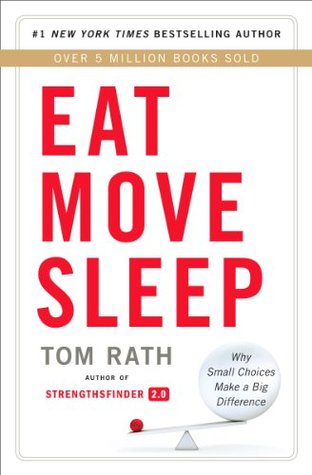More on this book
Community
Kindle Notes & Highlights
by
Tom Rath
Read between
December 17 - December 18, 2018
On average, the best performers slept 8 hours and 36 minutes.
Walking increases energy levels by about 150 percent. Taking the stairs instead of the elevator increases energy by more than 200 percent. Instead of viewing a long walk as something you don’t have time for, think of it as an opportunity to get in some extra activity that will make you healthier.
Sugar is a toxin. It fuels diabetes, obesity, heart disease, and cancer. At the current dose we consume, more than 150 pounds per person every year, sugar and its derivatives kill more people than cocaine, heroin, or any other controlled substance around.
Something as simple as forcing yourself to put your food, arm, fork, or spoon down between bites can help you avoid rapidly shoveling food into your mouth. Savor the first few bites of each meal. Learn to enjoy the process of eating foods that are good for you.
One experiment found that participants who consumed omega-3s had a 20 percent reduction in anxiety levels and a significant reduction in inflammation, compared with a control group.
According to one scientist who has studied this extensively, four hours of sleep loss produces as much impairment as a six-pack of beer. A whole night of sleep loss is equivalent to a staggering blood alcohol level of 0.19 percent. That’s double most legal limits.
When you break your final hour of sleep into small half-awake chunks, studies show it does not count toward the total amount of deep restorative sleep. For the next few weeks, set your alarm at the latest possible time so hitting the snooze button is not an option. Force yourself to get up right away. Those extra minutes can give you enough sleep so you feel refreshed.
In one study, scientists found that the use of constant background noise can be remarkably effective at improving sleep. People who were assigned to sleep in a room with constant noise slept far better when compared with people in a control group who slept in a quiet room. Researchers also noted much higher quality sleep patterns among the people assigned to rooms with constant noise, based on EEG monitoring of brain activity throughout the night.
A Swedish study found that couples in which one partner has a commute longer than 45 minutes are a whopping 40 percent more likely to get divorced.
A classic study titled Stress That Doesn’t Pay: The Commuting Paradox found that not even a big pay raise or larger house is worth it if you have to add an hour to your commute. These researchers found that for every extra hour of total commuting time per day, you would need a corresponding 40 percent increase in your salary to make the added car time worthwhile. With this in mind, whenever you are considering a major move — for school, work, or a new home — start by asking if it will help you spend less time commuting and more time with the people who matter.
When they used the less familiar hand, study participants ate considerably less popcorn.
Start by knowing two fundamental metrics: your cholesterol and your blood pressure. As one article put it, knowing these numbers “is as fundamental to heart health as knowing the alphabet is to reading.” With cholesterol, look at the balance of good (HDL) versus bad (LDL) metrics in particular, as total cholesterol can be misleading.


